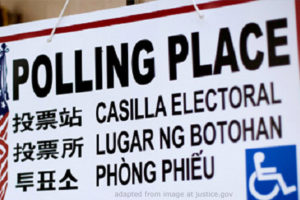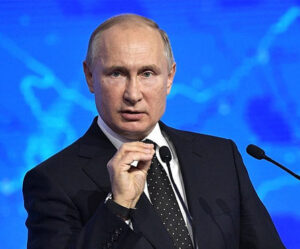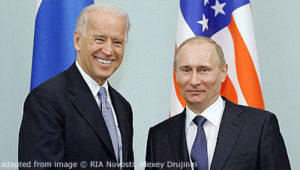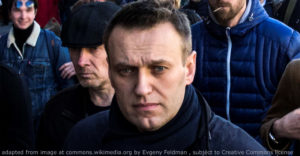Exposing Putin’s Hidden Riches Won’t Stop Russia’s Election Meddling

(Russia Matters – russiamatters.org – Lincoln Pigman – Aug. 19, 2020)
Lincoln Pigman is a research fellow at the Foreign Policy Center and an alumnus of King’s College London’s Department of War Studies and Oxford University’s School of Global and Area Studies.
Four years have passed since the alarm was first raised about Russia’s meddling in U.S. elections, from its influence operations on social media, to its hacking and leaking of Democratic National Committee emails, to its penetration of voter systems. If the U.S. intelligence community’s warnings are to be believed, Moscow is already trying to sway November’s presidential contest, albeit on a smaller scale than in 2016.
Yet as things stand, I would argue that Washington still lacks a realistic plan for deterring Moscow from election interference, even after multiple rounds of trial and error. The verbal warnings to Russia by then-President Barack Obama and then-CIA director John Brennan and a joint attribution statement issued by the Department of Homeland Security and the Office of the Director of National Intelligence famously didn’t work in 2016. Neither did Washington’s retaliatory seizure of diplomatic property, imposition of sanctions and expulsion of spies; the U.S. Treasury’s naming and shaming of Russia’s wealthy; the sanctioning and indictment of the Russians behind the 2016 intervention; nor U.S. Cyber Command’s targeting of Russian internet operatives, judging by Moscow’s efforts to meddle in the 2018 elections.
 One approach that seems to have won more than a few supporters in Washington would have the United States take the fight to Russian President Vladimir Putin by determining the true size and origins of his wealth and, should it prove suspiciously large or appear ill-gotten, threatening to reveal or revealing it. The measure—one of several contemplated in the final months of Obama’s presidency—has been championed in major newspapers’ opinion pages and endorsed by the Senate Foreign Relations Committee’s Democratic minority. When asked in a 2019 primary debate whether, if elected president, they would act on Senate Democrats’ call to “publicly revea[l] what the U.S. knows about Putin’s corruption,” all three Democratic presidential hopefuls given the chance to speak said yes.
One approach that seems to have won more than a few supporters in Washington would have the United States take the fight to Russian President Vladimir Putin by determining the true size and origins of his wealth and, should it prove suspiciously large or appear ill-gotten, threatening to reveal or revealing it. The measure—one of several contemplated in the final months of Obama’s presidency—has been championed in major newspapers’ opinion pages and endorsed by the Senate Foreign Relations Committee’s Democratic minority. When asked in a 2019 primary debate whether, if elected president, they would act on Senate Democrats’ call to “publicly revea[l] what the U.S. knows about Putin’s corruption,” all three Democratic presidential hopefuls given the chance to speak said yes.
That same year, the House of Representatives passed a bipartisan bill along the same lines sponsored by Rep. Val Demings, D-Fla. “[T]he United States should do more to expose the corruption of Vladimir Putin,” reads Demings’s bill, the avowed aim of which is “[t]o strengthen the United States response to Russian interference.” Although the Vladimir Putin Transparency Act has languished in the Senate since March 2019, it is the first of at least three election meddling bills requesting a determination of Putin’s net worth to be approved by a chamber of Congress.
 Biden—who has joined the chorus of officials warning that Russia is “still engaged in trying to delegitimize our electoral process,” citing intelligence briefings he is receiving as his party’s presumptive nominee—seems to be on board. In a July 2020 statement “putting the Kremlin … on notice” for its continuing efforts to interfere in American elections, Biden called “the exposure of corruption” one of several “substantial and lasting costs” he could “impose” on a meddling Moscow as president.
Biden—who has joined the chorus of officials warning that Russia is “still engaged in trying to delegitimize our electoral process,” citing intelligence briefings he is receiving as his party’s presumptive nominee—seems to be on board. In a July 2020 statement “putting the Kremlin … on notice” for its continuing efforts to interfere in American elections, Biden called “the exposure of corruption” one of several “substantial and lasting costs” he could “impose” on a meddling Moscow as president.
 The idea’s logic is straightforward. Thanks to journalists as well as Russian opposition figures like Alexei Navalny and the late Boris Nemtsov, there is much documentation of the excesses of top Russian officials, from their luxury mansions and apartments at home and villas abroad, to their private jets and designer watches. If their lavish lifestyles are any indication, Putin surely lives on more than just his presidential salary of nearly 9.3 million rubles (approximately $130,000) per year. Such was then-U.S. Secretary of State Condoleezza Rice’s suspicion in 2008, when she wrote in a cable later leaked by WikiLeaks that Putin had “illicit proceeds” hidden overseas. For reference, nearly 45 percent of Russians reported making less than 15,000 rubles (approximately $210) per month in June 2020, a figure that stood at about 38 percent before the outbreak in earnest of COVID-19 in Russia.
The idea’s logic is straightforward. Thanks to journalists as well as Russian opposition figures like Alexei Navalny and the late Boris Nemtsov, there is much documentation of the excesses of top Russian officials, from their luxury mansions and apartments at home and villas abroad, to their private jets and designer watches. If their lavish lifestyles are any indication, Putin surely lives on more than just his presidential salary of nearly 9.3 million rubles (approximately $130,000) per year. Such was then-U.S. Secretary of State Condoleezza Rice’s suspicion in 2008, when she wrote in a cable later leaked by WikiLeaks that Putin had “illicit proceeds” hidden overseas. For reference, nearly 45 percent of Russians reported making less than 15,000 rubles (approximately $210) per month in June 2020, a figure that stood at about 38 percent before the outbreak in earnest of COVID-19 in Russia.
Amid public dissatisfaction with the state of Russia’s economy and anger at the country’s arrogant and out-of-touch officials, advocates of such a move anticipate that revelations about Putin’s riches would erode his regime’s legitimacy. The result they envision is a win-win situation for the United States: either Putin prioritizes his political survival and ends his efforts to subvert American democracy or he pays a significant political price at home for his continued interference in American elections.
Aside from the need to secure the vote from foreign meddling and a desire to exact revenge for 2016, the idea’s supporters claim to be motivated by their solidarity with ordinary Russians, at whose expense Putin has enriched himself since assuming the presidency at the turn of the century. However, their optimism betrays a lack of understanding of Russia’s internal dynamics.
The most obvious obstacle to the effect they desire is Russians’ acute awareness of the extent of state corruption. According to polling conducted last year by Russia’s independent pollster, the Levada Center, 41 percent of Russians consider corruption to be one of society’s most alarming problems, an 8 percent increase from a year earlier and the highest level of concern about corruption registered since Levada Center researchers began asking respondents to name society’s most alarming problems in 1998. Only rising prices and poverty, which 59 and 42 percent of respondents identified, respectively, worried Russians more at the time.
A mere 3 percent believe that officials’ income declarations are entirely accurate, with 77 percent taking the view that officials decline to declare most or almost all of their wealth. Moreover, according to polls conducted by Russia’s Public Opinion Foundation in 2019, 70 percent of respondents deem corruption in Russia to be high; as many say it is on the rise or holding stable; 45 percent take the view that corruption in Russia is worse than in most European countries; and more than half think it’s impossible to eradicate, something nearly half of respondents say the state is unwilling to do anyway.
Russians, then, admit that government corruption is pervasive and problematic, but they do not see a way out. As mentioned above, they also know enough about the alleged excesses of those around Putin—officials like former president and prime minister Dmitry Medvedev and ex-first deputy prime minister Igor Shuvalov, as well as friends like Sergei Roldugin and relatives like Lyubov Shelomova—to surmise that he must be living just as comfortably, if not more so. Moreover, Russians already regard Putin as primarily representing the interests of oligarchs, according to a recent Levada Center poll. His perceived connections to corrupt politicians happen to be one of the two things Russians dislike most about him, according to that April 2020 poll. As such, any revelations about Putin’s true wealth are likely to serve only to confirm what Russians already suspect.
In addition, if released by, or seen to be coming from, the U.S. government, such information would probably face a credibility issue. According to polling conducted in 2017 by the Levada Center, more than half of Russians say there is an “information war” between Russia and the West, a framing that Russia’s leaders regularly use to discredit foreign critics and potentially embarrassing disclosures like the Panama Papers—evidently with some success.
Indeed, as the closest thing to the kind of disclosure being contemplated in Washington, the case of the Panama Papers, which tied Roldugin to offshore companies with cash flows of up to $2 billion, is instructive. At the time, Putin dismissed them as the work of “certain U.S. officials and agencies,” while Kremlin spokesman Dmitry Peskov called them the latest manifestation of the West’s “Putinphobia” and pro-government media emphasized their revelations concerning foreign leaders like Ukraine’s then-president, Petro Poroshenko, and Britain’s then-prime minister, David Cameron.
In the end, the Panama Papers did little to undermine Putin’s position at home, however incensed Putin may have emerged from the affair. Were the United States to reveal Putin’s true wealth in retaliation for his government’s continued efforts to meddle in U.S. elections, such a disclosure would likely be similarly spun by the authorities and perceived by the public as a broadside in the West’s information war with Russia, not as a gesture of support for ordinary Russians and an attempt to hold Putin accountable for what Demings’s bill calls “his dishonesty and his persistent efforts to undermine the rule of law and democracy in the Russian Federation.”
To be sure, those less desensitized to corruption would find the revelations outrageous. Some could be expected to take to the streets to protest their president’s excesses. But Russian protesters’ poor record of forcing political change, at least at the federal level, gives little reason to expect anything but a repressive response. Similarly, the efforts of civil society and opposition figures to damage Putin’s image by amplifying the United States’ disclosure would likely prompt the aggressive application of the Kremlin’s toolkit for countering so-called foreign agents if not also the introduction of new restrictions on Russians’ freedoms.
On the deterrence front, the United States would find the potential of its putative nuclear option exhausted—after all, one can only reveal Putin’s true wealth once. It would also find Moscow not cowed but determined to exact revenge for Washington’s open albeit reciprocal intervention in its internal affairs. (Indeed, according to The Washington Post, that is how some Obama administration officials viewed the idea, objecting that “engaging in the same behavior [the United States] was condemning” “would send the wrong message.”) Washington would be forced to either dig in in anticipation of a repeat of 2016 or keep escalating in the hope of deterring Russia.
I doubt that revelations about Putin’s ill-gotten gains would deter Russia from interfering in U.S. elections, much less make life significantly more difficult for Putin at home. Exposing Putin’s hidden riches may feel good, but, in my view, the material consequences outlined above would do little to advance U.S. interests. Insofar as countering kleptocracy in Russia is one of Washington’s goals, a subtler approach would avoid provoking a patriotic backlash against both the United States and the opposition, and deny the Kremlin ammunition for its narrative that a foreign hand lurks behind all criticism of the authorities. Best to leave the exposés to Putin’s domestic critics and to let his government continue shooting itself in the foot through missteps that strain its relations with ordinary Russians, of which there have been many since Putin’s re-election in March 2018.
Take the raising of retirement ages that year, a move that experts say permanently dented Putin’s standing. Trust in the president, as measured by a question asking respondents to identify the five or six political figures in Russia they trust most, fell from 59 percent in November 2017 to 39 percent the following September, shortly before the changes were signed into law. Today, according to the Levada Center, the figure stands at 23 percent. Putin’s job approval rating is much higher, but it also captures a fall in popularity, declining from 83 percent in July 2017 to 67 percent in July 2018 and standing at 60 percent today.
As for the endeavor of countering election meddling, it must be part of a broader effort to counter foreign interference in U.S. elections, a challenge that is not specific to Russia. What the United States ideally needs is a response that deters not only Russia but also Iran and possibly China, all while the country builds resilience to such interventions. Indeed, what one former U.S. National Security Council official has said of U.S. efforts to deter cyberattacks also holds true for preventing election meddling: “It’s possible that we don’t have a better option than to create less exposure.”
The plan to blackmail Putin into backing down, then, suffers from more than one fatal flaw. It not only misreads Russia’s internal dynamics in predicting success in either deterring or destabilizing the country but also forgets that Russia is hardly the only country about which the United States should be worried as it seeks to secure its elections from foreign interference. Even a bilateral pact committing the United States and Russia to non-interference and observed by both parties would represent an insufficient response in leaving other threats to the integrity of U.S. elections unaddressed.
As Nov. 3 nears, it is important to think soberly about the threat of Russian interference-and election meddling more generally-and avoid action that may be more costly than beneficial to the United States’ security and its broader interests. To reiterate, that means acting on an accurate understanding of Russia’s internal dynamics while also keeping in mind the need to address the election interference efforts of adversaries other than Moscow. The debate on deterring foreign adversaries from undermining the integrity of U.S. elections is closer to its beginning than to its end, and just how much work remains to be done is clear from the deep flaws in one of Washington’s more popular plans to stop Russia’s election meddling.
Article also appeared, with different images, at russiamatters.org/analysis/exposing-putins-hidden-riches-wont-stop-russias-election-meddling, with different images, bearing the notice: “© Russia Matters 2018 … This project has been made possible with support from Carnegie Corporation of New York,” with a footer heading entitled “Republication Guidelines” linking to: russiamatters.org/node/7406, which bears the notice, in part:
“If you would like to reprint one of these articles, a blog post written by RM staff, one of our infographics or a fact-check, we ask that you follow these guidelines:
- Include a prominent attribution to Russia Matters as the source and link back to the original at RussiaMatters.org.
- Retain the hyperlinks used in the original content.
- Do not change the meaning of the article in any way.
- Get an ok from us for non-substantive changes like partial reprints or headline rewrites and inform readers of any such modifications (e.g., This article first appeared on the Russia Matters website with the headline “Russian Election Interference in Trump’s Own Words”).
- Let us know about the reprint and send a link!
Please note that Russia Matters cannot grant permissions for third-party content, including articles, photographs and other materials not produced by our team.
Questions? Email us at RussiaMatters@hks.harvard.edu.”
[images are file images from other occasions; Navalny image is file photo, adapted from image at commons.wikimedia.org with credit to Evgeny Feldman, subject to Creative Commons license; original image at commons.wikimedia.org/wiki/File:FEV_1795_(cropped1).jpg, with license information at creativecommons.org/licenses/by-sa/4.0/deed.en and creativecommons.org/licenses/by-sa/4.0/legalcode]
